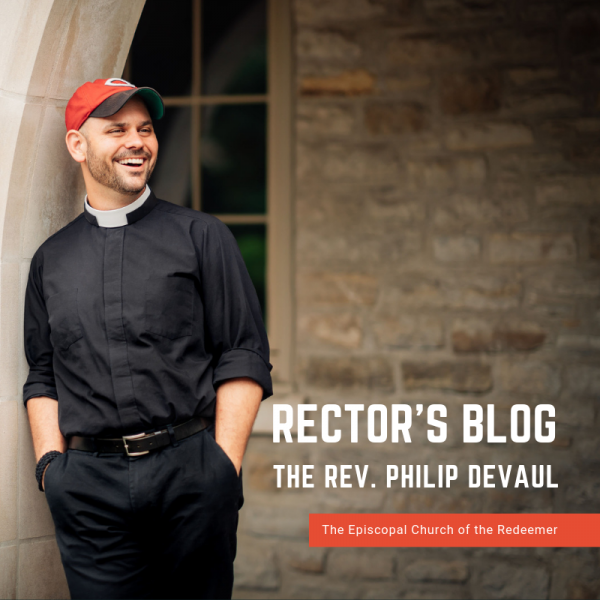Rector's Blog: When Love Shows Up

We don't get to decide when Love shows up.
And we don't get to decide what it looks like.
Throughout this season of Lent, the church is reading a lot from the Gospel according to John. These readings focus on something very specific and, it turns out, very timely. In John’s Gospel God is Love, and Love shows up in Jesus and by and large people have no idea what to do with him, with Jesus, with Love, with God. And the reason they don’t know what to do with Love when it’s right in front of them? Because it doesn’t look the way they expected.
It might be stating the obvious, but I’m a huge fan of the obvious, so I’ll just say that love manifests itself in different ways throughout our lives. It doesn’t always look the same, and it doesn’t even always feel the same. When love shows up, it’s often in an unexpected, an unforeseen place, and rarely is it in a time or manifestation of our choosing.
The Israelites of Jesus’ time are looking for a very specific kind of love: They want a love that looks like deliverance – and I don’t mean some sort of metaphysical deliverance from a hypothetical afterlife Hell. They are under Roman rule, second and even third-class citizens in a vassal state. These people who are defined by the confession that their God is the one and only Lord are forced to walk around with money in their pockets that says, “Caesar is Lord” – an embarrassing symbol of their powerlessness in a hopeless situation.
But they believe God loves them, and that because God loves them, a messiah – a divine deliverer will show up and rescue them from Roman rule, will secure their independence, restore their political autonomy, will enforce justice, will make things right.
Well, the messiah of God does show up, but he doesn’t deliver them from Roman rule, secure their independence, restore their political autonomy or enforce much of anything. Instead, Jesus heals whoever is right in front of him, touts the humanity of Israel’s enemies, insists on the dignity of people who seem like walking disasters, blesses the unblessable, and preaches a personal transformation based in forgiveness and mercy. It’s obnoxious, really. Waiter, this is not the kind of love we ordered. Kindly take it back.
Yet, because of the honesty of Jesus’ teaching, the authenticity of his ministry, the selflessness of his death, and the magnificence of his resurrection – a group of people came to believe that, even if this was not the love they had expected, or even the love they’d hoped for, it was indeed and unquestionably Love that had showed up in Jesus, the delivering messiah of God. They were called Christians.
That’s us, Redeemer. We’re Christians. We believe in a Love that powerfully shows up in our daily lives. We also believe that, however frustrating it may be, that Love doesn’t always look the way we think it will or show up in the time or manner of our choosing.
Now is the time for us to remember we believe that.
We are living in the midst of great fear and frustration. We who often define ourselves by our work are sitting at home, many of us unable to do our jobs, others of us out of a job altogether. Our lives have been interrupted by a sickness we may or may not have – we may or may not know if we get, and we may or may not give to others. What if we’ve already gotten someone sick? What will happen to our school year? Our sports season? Our Easter? Our economy? The powerlessness is palpable.
We want Love to show up and obliterate COVID-19 and get our lives back to normal. This is what divine deliverance should look like, right?
Our experience of God in Jesus Christ has shown us that Love shows up in our daily lives. It has also trained us to see that when Love shows up, it won’t be that simple. As Oscar Wilde once wrote, the truth is rarely pure and never simple. And the truth of Love is not found in easy fixes that get things back to normal. Love doesn’t stop the interruption but exposes it. Love doesn’t erase our pain; it repairs our wounds.
Now is the time for us to recognize Love showing up. You and I were trained to see the love of God in Jesus Christ. Which is to say, we have been trained to find love in the real practical now of our current context. Love is not the stuff of abstract ideas or fanciful hopes – Love is the marrow and purpose of real life: We find it in the process of healing and humanizing, in the act of blessing and forgiving.
We want Lent to be about giving up chocolate or meat or swear words. This year God made us give up gathering and hugging. We wanted to pray more or lose a few pounds – God has decided we’re to stay home and save lives instead. Please don’t make the mistake of thinking that this means Love isn’t showing up. Remember the church’s one foundation: The Love that shows up every day in real and obnoxiously beautiful ways – Jesus Christ pushing us to see God’s deliverance differently again and again and again.
Our job is not to wonder if God's love will show up.
It's here.
Our job is to recognize that powerful Love, and to participate with Love in the healing of the whole world. It's the work of a lifetime.
Tags: Rector's Blog